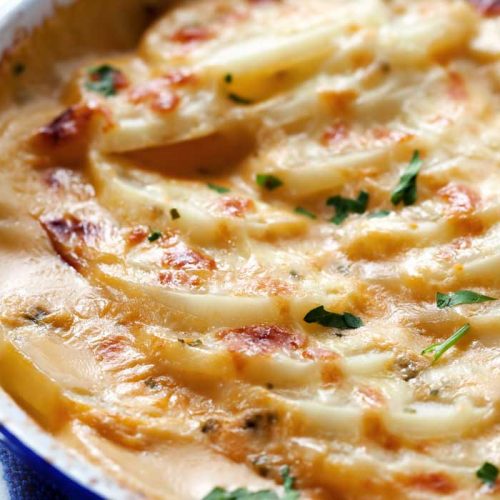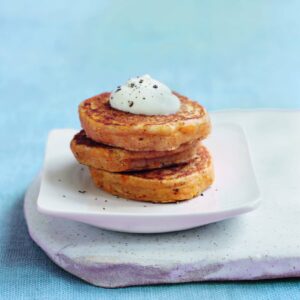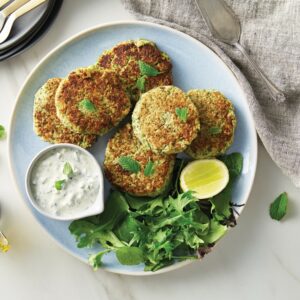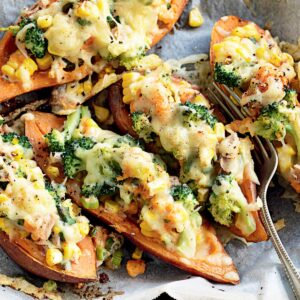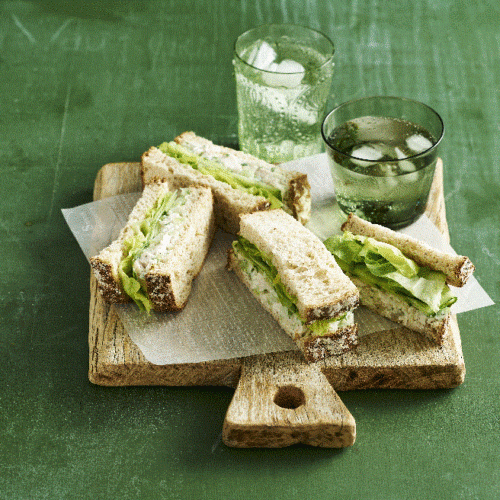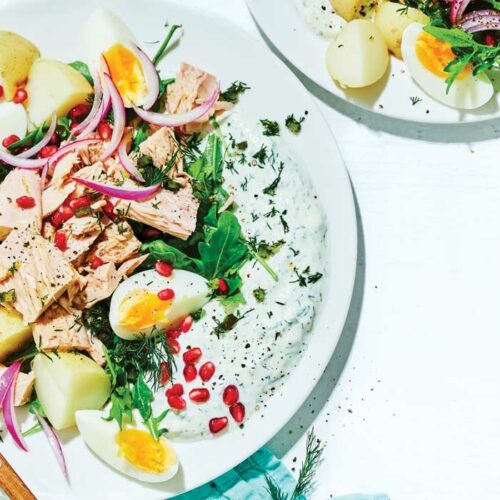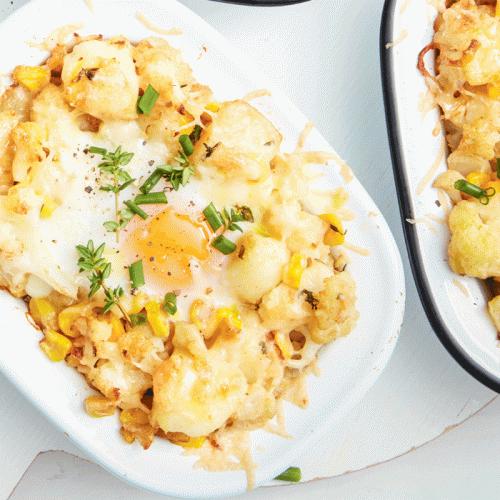
Gut bacteria, microbiome, probiotics… what do they mean for our daily diet and overall health? We ask a leading gut expert and dietitian for practical advice on how to have healthy gut bacteria.
Many people who want to ease gut complaints like bloating may be aware of the importance of gut bacteria. But improving the diversity of the trillions of bacteria that live in our gut is increasingly being seen as a key basis for our overall health. Here’s how to harness their power.
What we know so far about gut bacteria
Researchers have identified between 1000–1500 species of bacteria in our gut microbiota, the name for the mixture of bacteria, yeasts and fungi found in the digestive tract.
Research to date suggests that the state of our gut microbiota may affect a multitude of other health issues. These range from general immunity to Irritable Bowel Syndrome (IBS), bloating and inflammatory bowel diseases like Crohn’s disease. Our gut health also affects the stiffness of arteries in heart disease, as well as skin conditions, kidney disease and even mental health disorders such as anxiety and depression.
“We now believe the gut microbiota can affect just about every organ in the body and is very important in the body’s immune system,” says Australian-born dietitian Megan Rossi from King’s College London.
“It’s only early days, in that we’ve yet to determine whether intervening on the gut microbes can improve the health of our other organs, with diets targeting gut microbes, but that is where science is heading. It’s looking promising in many areas, including our mental health,” Dr Rossi says.
“The intestine is 9 metres long, and 70 per cent of our immune system lies within it, so it’s clearly essential to our immunity. We also know the microbiota produces molecules that get into our blood and can ‘talk’ to our brains and other organs.”
Scientists worldwide — biologists, immunologists and epidemiologists — are working on new ways to bring the latest thinking into the public domain. Meanwhile, to help us use what we do know,
Rossi offers basic principles and practical tips for achieving a healthy gut microbiota based on the very latest (non-faddy) science.
1 Think diversity, not ‘good’ or ‘bad’ bacteria
“The first thing to realise is that you need to eat as wide a range of plant-based foods as possible,” Dr Rossi advises.
“In clinic, I tell people to aim for 30 different plant-based foods a week — that includes different types of nuts, seeds, whole grains, legumes, and fruit and vegetables. Research suggests if you’re having fewer than 10 of these plant-based foods a week your microbial diversity isn’t very strong. Vary the foods you eat from week to week, and always be open to trying new things.”
2 Eat fibre-rich foods
The fibre found in certain (but not all) high-fibre foods contains prebiotics, which ‘feed’ the beneficial bacteria that live in your gut. Foods that contain these very beneficial prebiotics include beans, legumes, artichokes and Brussels sprouts.
“Fibre is a Holy Grail nutrient,” Dr Rossi says.
“If you can increase the amount that you eat it will benefit pretty much every organ in your body, including your heart.
“Current guidelines recommend we should be eating 30g fibre a day, but most of us are only eating 19g. I believe we should be aiming even higher. Increase the amount you eat gradually to give your body time to adjust to it.”
3 Eat healthy fermented foods every day
Fermentation uses bacteria or yeast to make foods such as yoghurt, kefir (a traditional fermented milk drink that contains live bacteria) and kombucha (made from fermented tea, sugar, bacteria and yeast). They generally contain a wide range of bacteria types — so they’re believed to benefit the gut microbiome.
“I try to eat fermented foods every day,” Dr Rossi says.
“Kefir is the one with the most scientific evidence behind it. It has around 20 different types of bacteria and yeast in it, and the diversity is much greater than in yoghurt. I drink 100ml kefir a day. You can now buy kits with the kefir grain — you add milk and keep it on your kitchen bench to ferment for a few hours, and then it’s ready to drink.”
Other popular healthy fermented foods include kimchi — a type of spicy Korean pickled cabbage — and sauerkraut, a fermented cabbage.
4 Avoid artificial sweeteners
Although artificial sweeteners may help you reduce your kilojoule intake, they may also destroy the diversity of your gut microbiome. Clearly, this needs to be weighed up against the need to cut down on sugar.
“Evidence now coming from some animal studies suggests that artificial sweeteners are probably not a great thing to include in your diet in large amounts,” Dr Rossi says.
“Whether it is better to have sugar instead of sweeteners depends on a number of things, including your weight and medical history. It’s about balance. It’s fine to enjoy a small 30g chocolate bar every now and then, but regularly overdoing it with a big bag of sweets is never going to be a good idea!”
5 Always buy ‘live’ yoghurt
Although there are a multitude of yoghurt types on the market, not all of them contain beneficial gut bacteria. “Look out for tubs with labels that say they contain live cultures,” Dr Rossi says.
“It doesn’t really matter if they’re full fat or made from skim milk.”
6 Take probiotics only after antibiotics or if you have IBS
There isn’t any evidence that taking a probiotic supplement offers health benefits to healthy people, but studies show specific strains of bacteria can help treat certain conditions.
“If you’re taking antibiotics, for instance, one strain of yeast, called Saccharomyces boulardii, can reduce the incidence of diarrhoea by 50 per cent, which affects around one-third of people taking antibiotics,” Dr Rossi says.
“It’s quite specific and prescriptive, though – not just any probiotic will have that effect, and not just any dose.
“When it comes to IBS, there are four probiotic supplement products on the market that have been shown in a study to be effective in treating symptoms. These are Symprove, Alflorex/Align, Bio-Kult and VSL#3. I wouldn’t go as far as to say that these would work for everybody with IBS, however, as this evidence comes from a single study. When researchers have pooled the results of all studies together, they’ve found that probiotics reduce IBS symptoms by 20 per cent.”
7 Swap staple foods regularly
“If you eat rice a lot, try wild rice, quinoa or buckwheat, and aim to get more ancient grains on your plate,” Dr Rossi says.
“Even eating yellow and green capsicum, as well as red, will help. If you’re buying chickpeas, why not get a can of four bean mix instead, and try butter beans, red kidney beans and black beans, too? Likewise with pasta — you can try wholegrain or legume versions.”
8 Eat Med to boost mood
“We have seen in some dietary interventional studies that eating a high-fibre, Med-style diet of fruit, vegetables, legumes, extra-virgin olive oil and whole grains can improve depression scores in some people,” Dr Rossi says.
“That’s not to say that people on medication should stop taking their pills – rather, that eating a high-fibre Mediterranean diet alongside taking their medication may improve their mood.”
9 Forget the low-carb fad
“The ramifications of the low-carb diet trend without a medical recommendation are quite worrying, because fibre is a type of carbohydrate,” Dr Rossi says.
“In the short term you can lose weight, but you can also damage your gut bacteria, which may, in the long run, have consequences such as an increased risk of colon cancer.”
10 Don’t do the low-FODMAP diet unaided
You may be tempted to try this diet to ease IBS symptoms such as bloating, wind and diarrhoea. It involves avoiding a type of poorly absorbed carbohydrate found in foods such as onions, garlic, lentils, cabbage, cauliflower, broccoli and wheat. But it should not be undertaken without the supervision of a qualified dietitian, Dr Rossi warns.
“The low-FODMAP diet can be very useful for some types of IBS, but it shouldn’t be the first port of call,” she says.
“For one thing, many FODMAPs are essentially prebiotics, so by cutting them out you could be starving your gut bacteria of food. Also, the diet should only be followed for four–to–six weeks. After that, FODMAPs should be systematically re-introduced with the help of a dietitian — so you can identify what your tolerance is.”
Top 5 gut-friendly foods
Add these foods to your daily diet to boost your gut health!
- Wholegrain breads and cereals barley, oats, rye, buckwheat, wild rice
- Fermented dairy foods: kefir, yoghurt, cheese
- Legumes: beans, chickpeas, lentils
- Fruit and vegetables: colourful, high-fibre produce with skin on like bananas, berries, sweet potato, corn, tomatoes, broccoli
- Nuts and seeds: almonds, cashews, walnuts, flaxseeds, chia seeds
For gut health, eat 30 different types of plant foods a week including nuts, grains and veges
Article sources and references
- Better Health Channel. 2014. Fibre in food. Accessed November 2019.https://www.betterhealth.vic.gov.au/health/healthyliving/fibre-in-food
- Dai et al. 2013. Probiotics and irritable bowel syndrome. World J Gastroenterol. 19(36): 5973–80.https://www.ncbi.nlm.nih.gov/pubmed/24106397
- Fayet-Moore et al. 2018. Dietary Fibre Intake in Australia. Paper I: Associations with Demographic, Socio-Economic & Anthropometric Factors. Nutrients. 10(5): 599.https://www.ncbi.nlm.nih.gov/pubmed/29751656
- Harper et al. 2018. The role of bacteria, probiotics and diet in irritable bowel syndrome. Foods. 7(2): 13.https://www.ncbi.nlm.nih.gov/pubmed/29373532
- Jacka et al. 2017. A randomised controlled trial of dietary improvement for adults with major depression (the ‘SMILES’ trial). BMC Medicine. 15(1): 23.https://bmcmedicine.biomedcentral.com/articles/10.1186/s12916-017-0791-y
- Kelesidis, T & Pothoulakis, C. 2012. Efficacy and safety of the probiotic Saccharomyces boulardii for the prevention and therapy of gastrointestinal disorders. Therap Adv Gastroenterol. 5(2): 111–25.https://www.ncbi.nlm.nih.gov/pmc/articles/PMC3296087/
- McDonald et al. 2018. American Gut: an Open Platform for Citizen Science Microbiome Research. mSystems. doi: 10.1128/mSystems.00031–18.https://msystems.asm.org/content/3/3/e00031-18
www.healthyfood.com







